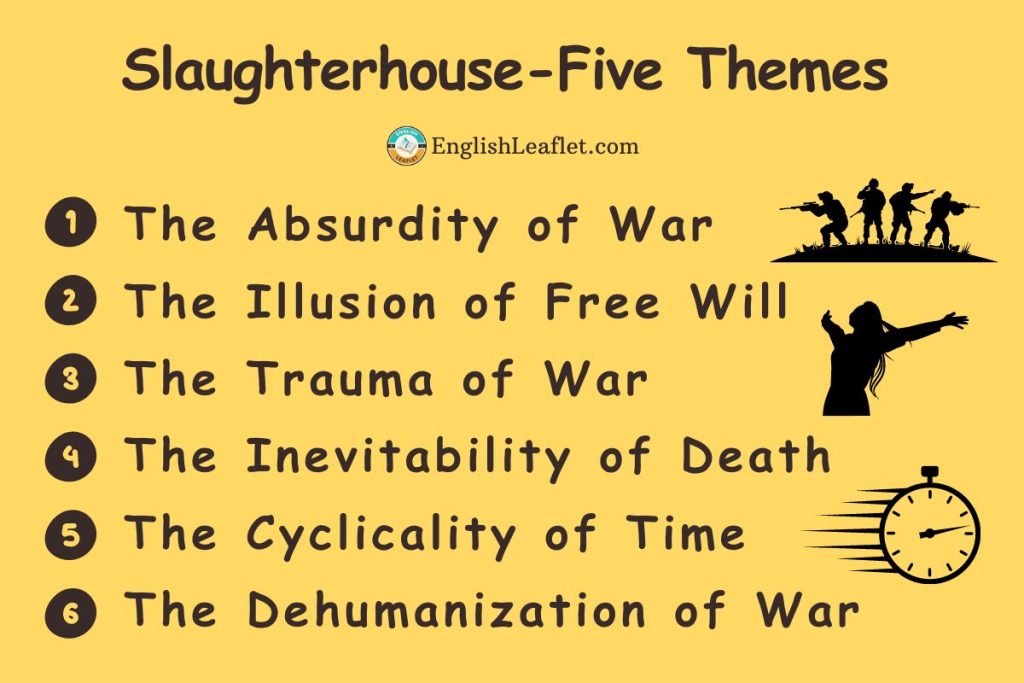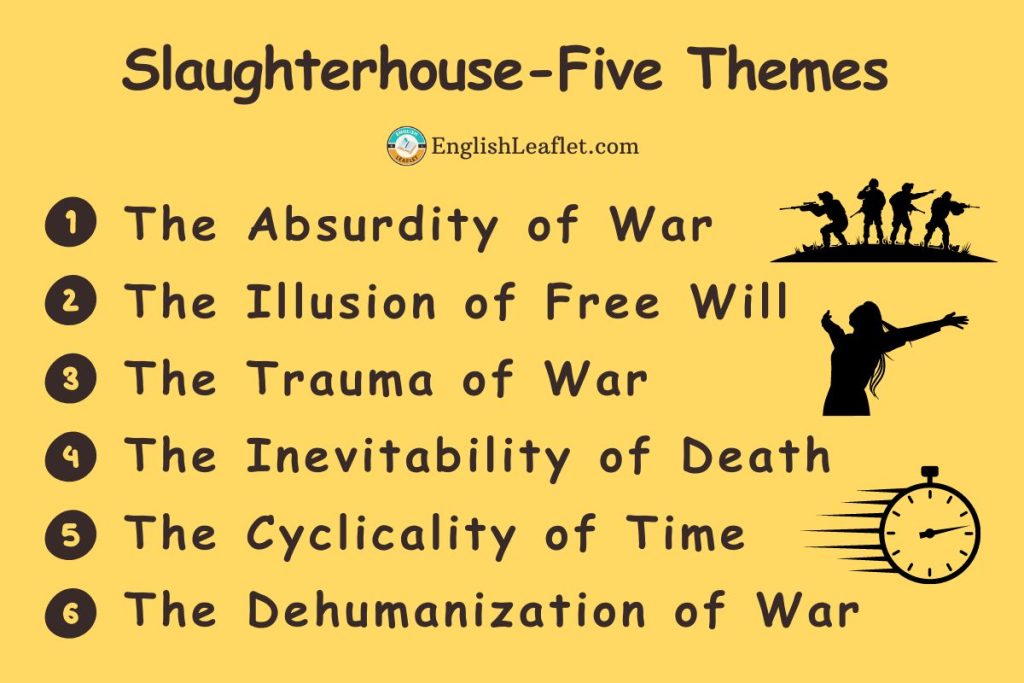Introduction to Slaughterhouse-Five
”Slaughterhouse Five” authored by Kurt Vonnegut Jr. and published in 1969, is one of the most significant postmodern novels of the American literature that incorporates features of science fiction, autobiography and satire. The main theme of the novel is the life of Billy Pilgrim, a soldier of the World War-II who gets ‘unstuck in time’ and lives his life in a particular order.
The innovative approach to the novel enables Vonnegut to reflect on the themes of war and its aftermath, the idea of free choice, and time as the most significant and the least comprehensible factor in the people’s lives. Published against the background of the fire bombing of Dresden in which Vonnegut himself was a POW, “Slaughterhouse-Five” is both an intensely personal and a very timely look at the human experience.
Themes in “Slaughterhouse-Five”
1- The Absurdity of War
War is the most significant theme in “Slaughterhouse-Five”. It is evident through relating the events of the novel to reality, especially concerning the World War-II. Vonnegut employs the destruction of Dresden as an example of irrationality that lies at the core of armed confrontation.
“So it goes.”
This phrase was used repeatedly in the novel as and when the death or mortality was mentioned. It symbolizes the fact of death and its randomness in the war, which in combination with the main title, eliminates any chances of the human mind to find a rational explanation for death and destruction.
2- The Illusion of Free Will
The issues of free will are raised for discussion in the novel very often, and people seem to be helpless in front of greater powers. The Tralfamadorians, alien being, with the ability to look at existence as one large construct of time, are fitting examples here.
“Here we are, Mr. Pilgrim, trapped in the amber of this moment. There is no why.”
As the Tralfamadorian has the standpoint that everything is inevitable, free will is overshadowed. To them, every occurrence just happens – there is no purpose or rationale to any of it; humans can do nothing to sway it.
See also: Themes in Life of Pi
3- The Trauma of War
In the “Slaughterhouse-Five”, the author captures the aspect of post-war effects on psychologically affected soldiers. Thus, the phenomenon of time-traveling peculiar to Billy Pilgrim can be interpreted as the experience of individuals with post-traumatic stress disorder, which is characterized by the isolated and unstable condition of a trauma victim.
“Billy Pilgrim has come unstuck in time.”
Technically, in the case of Billy it seems that the experiences of being unstuck in time show the consequences of traumatic events that shape the present as representatives of the past. This disjoined narrative seems to be the intrusive memories and flashbacks common in PTSD.
4- The Inevitability of Death
Death is used as an extremely important element in “Slaughterhouse-Five”, where the theme shows that death is inevitable and ordinary. The frequent mentions of death in the novel as well as Tralfamadorian attitudes towards it embody this duality.
“Everything was beautiful, and nothing hurt.”
This epitaph on the tombstone of Billy used the basic emotions of human experience by prophesying life that is not full of pains and sufferings. It stands in stark contrast with the actual events in Billy’s life, which emphasize the fact that death cannot be avoided and that people do not give up their longing for comfort when facing pain.
5- The Cyclicality of Time
The cyclicality of time in “Slaughterhouse-Five” is very liberal, for instance time is represented by parallel instead of linear. In this cyclical view of time, newness is denied and recycles people’s perceptions of time, history, and affairs in a negative manner.
“And so it goes.”
The phrase is more than just about death, but it is also a way to express a cyclicality of life and history. Repetition of this phrase throughout the novel gives an indication that events have no beginning and will continue to be a cycle.
See also: Themes in The World Is Too Much With Us
6- The Dehumanization of War
Vonnegut expounds on the idea as to how the lives of people are desensitized especially in wars where people are treated as numbers or things. The novel depicts the dehumanizing effects of violence and the loss of individuality in the face of mass destruction.
“The Children’s Crusade.”
Vonnegut uses the term “children” to underline the young age of the soldiers and their ignorance, which indicates the tragedy of their dehumanization through the war. The title symbolizes the historical events where the young people were used to draw a parallel to the experiences of the soldiers.

See also: The Scarlet Letter (Quotes & Themes)
Quotes in “Slaughterhouse-Five”
Quote#1
“So it goes.”
This phrase has been used every time when the death is mentioned in the novel. It reflects the novel’s rather fatalistic approach to death. This is a clear depiction of how the Tralfamadorians see death as a form of moving from one place to another and not as a final stop, thus emphasizing on the aspect of death as part of life.
Quote#2
“Everything was beautiful, and nothing hurt.”
This quote engraved on Billy’s tombstone is rather an idealistic approach towards life, which does not contain suffering and pain. It is opposed to Billy’s experience of the world’s hardness, and reveals the human longing for tranquility and the difference between the dream and the real world.
Quote#3
“Poo-tee-weet?”
The last line of the novel is “Poo-tee-weet?” which is the sound of a bird, following the fire-bombing of Dresden. It represents the idea of life and the futile attempts of looking for some sense in the wake of such brutality. The bird’s song is the symbol of life that goes on even after the worst atrocities committed by humans.
Quote#4
“So now I am going to tell you about the time when I was a soldier in World War Two. I was in the Battle of the Bulge. I was taken prisoner by the Germans. After that, I was taken to Dresden, Germany, where I saw the greatest massacre in European history. I was a guard in a slaughterhouse.”
The quote sets out Billy’s main storyline and underlines the main incidents that define his life. It prepares the ground for the discussion of trauma, memory and the warped reality of war, thus giving the brief account of Billy’s ordeal.
Quote#5
“And Lot’s wife, of course, was told not to look back where all those people and their homes had been. But she did look back, and I love her for that, because it was so human.”
The quote indicates sympathy of Vonnegut towards the people and their tendency to turn back to the memories of suffering. It emphasizes the concept of memory, a common subject in many works of literature and the way that people, despite the suffering it may cause them, cannot help but look back on the past.
Quote#6
“I have told my sons that they are not under any circumstances to take part in massacres, and that the news of massacres of enemies is not to fill them with satisfaction or glee.”
This quotation shows Vonnegut’s opposition to the war and his intention to teach the people lessons for the future. It highlights the futility of the war and the need to preserve the principle of humanism in the conditions of extreme brutality.
Quote#7
“Billy is spastic in time, has no control over where he is going next, and the trips aren’t necessarily fun. He is in a constant state of stage fright, he says, because he never knows what part of his life he is going to have to act in next.”
The brief description of Billy’s time-traveling experiences depicts the confounding and unmanageable nature of the condition, which can be viewed as a symbol of PTSD. It explores the chaos and the pain of his recollections, which is relevant to the novel’s concern with psychological disorders.
Quote#8
“Among the things Billy Pilgrim could not change were the past, the present, and the future.”
This particular quote is the perfect reflection of the beliefs of the Tralfamadorians, which reminds the reader of the concept of fatalism. It postulates that everything is predetermined and cannot be altered, which concurs with the themes of the novel in regard to the freedom of choice.
Quote#9
“The Tralfamadorians can look at all the different moments just the way we can look at a stretch of the Rocky Mountains, for instance. They can see how permanent all the moments are, and they can look at any moment that interests them.”
This quotation describes how Tralfamadorians view time which is quite opposite to the way it is understand by the humans. It emphasizes the novel’s primary focus on cyclicality of time and questions the readers’ to understand the concept of the time.
Quote#10
“They were no doubt about it, very dead. Just because they were so sick of being dead, they became to explain, they imagined being dead in some ways was better than being alive.”
The quote depicts the demoralization of the war and the consequential endurance to death, which is even considered better than life. It points to the novel’s anti-war theme and the way the war affects the psyche of the people.
See also: Themes in “In Cold Blood”

